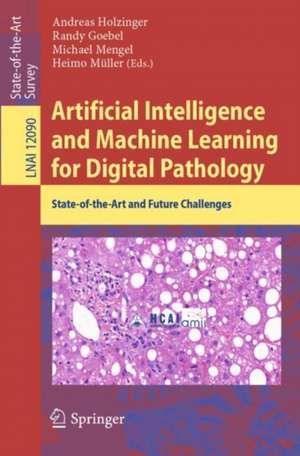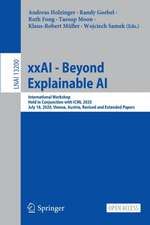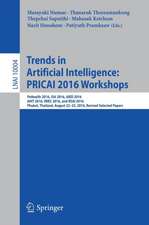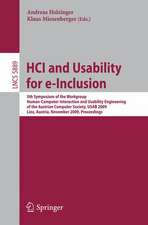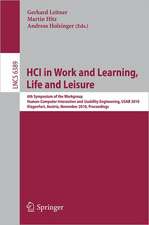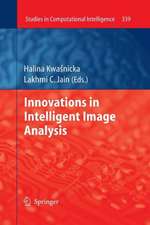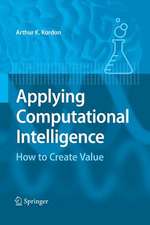Artificial Intelligence and Machine Learning for Digital Pathology: State-of-the-Art and Future Challenges: Lecture Notes in Computer Science, cartea 12090
Editat de Andreas Holzinger, Randy Goebel, Michael Mengel, Heimo Mülleren Limba Engleză Paperback – 21 iun 2020
Moreover, big data is required for training, covering a wide spectrum of a variety of human diseases in different organ systems. These data sets must meet top-quality and regulatory criteria and must be well annotated for ML at patient-, sample-, and image-level. Here biobanks play a central and future role in providing large collections of high-quality, well-annotated samples and data. The main challenges are finding biobanks containing ‘‘fit-for-purpose’’ samples, providing quality related meta-data, gaining access to standardized medical data and annotations, and mass scanning of whole slides including efficient data management solutions.
Din seria Lecture Notes in Computer Science
- 20%
 Preț: 1061.55 lei
Preț: 1061.55 lei - 20%
 Preț: 307.71 lei
Preț: 307.71 lei - 20%
 Preț: 438.69 lei
Preț: 438.69 lei - 20%
 Preț: 579.30 lei
Preț: 579.30 lei -
 Preț: 410.88 lei
Preț: 410.88 lei - 17%
 Preț: 427.22 lei
Preț: 427.22 lei - 20%
 Preț: 596.46 lei
Preț: 596.46 lei - 15%
 Preț: 448.04 lei
Preț: 448.04 lei - 20%
 Preț: 353.50 lei
Preț: 353.50 lei -
 Preț: 389.49 lei
Preț: 389.49 lei - 20%
 Preț: 309.90 lei
Preț: 309.90 lei - 20%
 Preț: 645.28 lei
Preț: 645.28 lei - 20%
 Preț: 763.23 lei
Preț: 763.23 lei - 15%
 Preț: 580.46 lei
Preț: 580.46 lei - 20%
 Preț: 310.28 lei
Preț: 310.28 lei - 20%
 Preț: 655.02 lei
Preț: 655.02 lei - 20%
 Preț: 1183.14 lei
Preț: 1183.14 lei - 20%
 Preț: 340.32 lei
Preț: 340.32 lei -
 Preț: 449.57 lei
Preț: 449.57 lei - 18%
 Preț: 938.83 lei
Preț: 938.83 lei - 20%
 Preț: 337.00 lei
Preț: 337.00 lei - 20%
 Preț: 649.50 lei
Preț: 649.50 lei - 20%
 Preț: 607.40 lei
Preț: 607.40 lei - 20%
 Preț: 1414.79 lei
Preț: 1414.79 lei - 20%
 Preț: 1024.44 lei
Preț: 1024.44 lei - 20%
 Preț: 583.40 lei
Preț: 583.40 lei - 20%
 Preț: 453.32 lei
Preț: 453.32 lei - 20%
 Preț: 575.49 lei
Preț: 575.49 lei - 20%
 Preț: 1075.26 lei
Preț: 1075.26 lei - 20%
 Preț: 585.88 lei
Preț: 585.88 lei - 20%
 Preț: 825.93 lei
Preț: 825.93 lei - 17%
 Preț: 360.20 lei
Preț: 360.20 lei - 20%
 Preț: 763.23 lei
Preț: 763.23 lei - 20%
 Preț: 340.32 lei
Preț: 340.32 lei - 20%
 Preț: 504.58 lei
Preț: 504.58 lei - 20%
 Preț: 369.13 lei
Preț: 369.13 lei - 20%
 Preț: 580.93 lei
Preț: 580.93 lei - 20%
 Preț: 343.62 lei
Preț: 343.62 lei - 20%
 Preț: 350.21 lei
Preț: 350.21 lei - 20%
 Preț: 583.40 lei
Preț: 583.40 lei - 20%
 Preț: 583.40 lei
Preț: 583.40 lei - 15%
 Preț: 438.59 lei
Preț: 438.59 lei - 20%
 Preț: 341.95 lei
Preț: 341.95 lei - 20%
 Preț: 238.01 lei
Preț: 238.01 lei - 20%
 Preț: 538.30 lei
Preț: 538.30 lei
Preț: 591.51 lei
Preț vechi: 739.39 lei
-20% Nou
Puncte Express: 887
Preț estimativ în valută:
113.20€ • 117.75$ • 93.45£
113.20€ • 117.75$ • 93.45£
Carte disponibilă
Livrare economică 24 martie-07 aprilie
Preluare comenzi: 021 569.72.76
Specificații
ISBN-13: 9783030504014
ISBN-10: 3030504018
Pagini: 341
Ilustrații: XII, 341 p. 95 illus., 84 illus. in color.
Dimensiuni: 155 x 235 x 28 mm
Greutate: 0.5 kg
Ediția:1st ed. 2020
Editura: Springer International Publishing
Colecția Springer
Seriile Lecture Notes in Computer Science, Lecture Notes in Artificial Intelligence
Locul publicării:Cham, Switzerland
ISBN-10: 3030504018
Pagini: 341
Ilustrații: XII, 341 p. 95 illus., 84 illus. in color.
Dimensiuni: 155 x 235 x 28 mm
Greutate: 0.5 kg
Ediția:1st ed. 2020
Editura: Springer International Publishing
Colecția Springer
Seriile Lecture Notes in Computer Science, Lecture Notes in Artificial Intelligence
Locul publicării:Cham, Switzerland
Cuprins
Expectations of Artificial Intelligence for Pathology.- Interpretable Deep Neural Network to Predict Estrogen Receptor Status from Haematoxylin-Eosin Images.- Supporting the Donation of Health Records to Biobanks for Medical Research.- Survey of XAI in Digital Pathology.- Sample Quality as Basic Prerequisite for Data Quality: A Quality Management System for Biobanks.- Black Box Nature of Deep Learning for Digital Pathology: Beyond Quantitative to Qualitative Algorithmic Performances.- Towards a Better Understanding of the Workflows: Modeling Pathology Processes in View of Future AI Integration.- OBDEX – Open Block Data Exchange System.- Image Processing and Machine Learning Techniques for Diabetic Retinopathy Detection: A Review.- Higher Education Teaching Material on Machine Learning in the Domain of Digital Pathology.- Classification vs Deep Learning in Cancer Degree on Limited Histopathology Datasets.- Biobanks and Biobank-Based Artificial Intelligence (AI) Implementation Throughan International Lens.- HistoMapr: An Explainable AI (xAI) Platform for Computational Pathology Solutions.- Extension of the Identity Management System Mainzelliste to Reduce Runtimes for Patient Registration in Large Datasets.- Digital Image Analysis in Pathology Using DNA Stain: Contributions in Cancer Diagnostics and Development of Prognostic and Theranostic Biomarkers.- Assessment and Comparison of Colour Fidelity of Whole slide imaging scanners.- Deep Learning Methods for Mitosis Detection in Breast Cancer Histopathological Images: a Comprehensive Review.- Developments in AI and Machine Learning for Neuroimaging.
Textul de pe ultima copertă
Data driven Artificial Intelligence (AI) and Machine Learning (ML) in digital pathology, radiology, and dermatology is very promising. In specific cases, for example, Deep Learning (DL), even exceeding human performance. However, in the context of medicine it is important for a human expert to verify the outcome. Consequently, there is a need for transparency and re-traceability of state-of-the-art solutions to make them usable for ethical responsible medical decision support.
Moreover, big data is required for training, covering a wide spectrum of a variety of human diseases in different organ systems. These data sets must meet top-quality and regulatory criteria and must be well annotated for ML at patient-, sample-, and image-level. Here biobanks play a central and future role in providing large collections of high-quality, well-annotated samples and data. The main challenges are finding biobanks containing ‘‘fit-for-purpose’’ samples, providing quality related meta-data, gaining access to standardized medical data and annotations, and mass scanning of whole slides including efficient data management solutions.
Moreover, big data is required for training, covering a wide spectrum of a variety of human diseases in different organ systems. These data sets must meet top-quality and regulatory criteria and must be well annotated for ML at patient-, sample-, and image-level. Here biobanks play a central and future role in providing large collections of high-quality, well-annotated samples and data. The main challenges are finding biobanks containing ‘‘fit-for-purpose’’ samples, providing quality related meta-data, gaining access to standardized medical data and annotations, and mass scanning of whole slides including efficient data management solutions.
Caracteristici
Digital pathology is a disruptive innovation that will markedly change health care in the next few years Biobanks play a central role providing large collections of high-quality well-annotated samples and data Future broad applications of Artificial Intelligence in digital pathology
